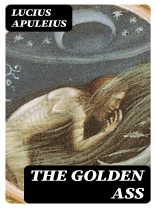In ‘The Golden Ass, ‘ Lucius Apuleius crafts a captivating narrative that intertwines elements of magic, philosophy, and social commentary, marking it as a significant work of the Roman literary tradition. This picaresque novel follows the misadventures of its protagonist, Lucius, who is transformed into a donkey through a botched magical experiment. Through vivid storytelling and humor, Apuleius explores themes of transformation, desire, and the quest for identity, all while offering intimate glimpses into the complexities of Roman life and the mystery religions of the time. The narrative is notable for its engaging prose style and rich character development, reflecting both the literary influences of earlier Greek romances and the burgeoning Latin narrative techniques of his contemporaries. Lucius Apuleius, a philosopher and rhetorician from Madaura in North Africa, was deeply influenced by Platonic thought and the cultural milieu of the Roman Empire. His mastery of language and deep understanding of both mythology and philosophy provided him with the tools to create a multifaceted tale that functions on various levels—entertaining while also reflecting on profound questions of existence and ethics. Apuleius’ own experiences in the realm of the esoteric and the philosophical are vividly mirrored in the spiritual journey of Lucius. ‘The Golden Ass’ is not only a pioneering work in the genre of fiction but also a thought-provoking exploration of the human condition. Readers interested in classics, transformation metaphors, or the interplay between the mundane and the divine will find Apuleius’ work both enriching and enlightening. This enduring tale invites its audience to reflect on their own lives, making it a must-read for anyone seeking deeper insights into humanity’s shared experiences.
Sobre el autor
Lucius Apuleius, an eminent figure of the Roman literary tradition, holds the distinction of being both a versatile author and a consummate Platonist philosopher. Born around 124 AD in Madauros, a Roman colony in North Africa, Apuleius was well-educated, having studied in Carthage and Athens, and thrived in his era’s intellectual circles. His eclectic interests ranged from rhetoric to philosophy, which is reflected in his literary corpus. Apuleius’s most celebrated work, ‘The Metamorphoses, ‘ commonly known as ‘The Golden Ass, ‘ is the only Latin novel to have survived in its entirety. This picaresque narrative offers an engrossing tale of magic, mischief, and metamorphosis, giving a unique insight into the religious and social life of the period. Centered on the protagonist Lucius, who is transformed into a donkey, the story weaves elements of satire, comedy, and the spiritual journey culminating in the initiation into the mysteries of the goddess Isis. Apuleius’s prose is characterized by its richness, ornate style, and the employment of a sophisticated narrative structure, including stories within stories, which engage readers on multiple levels. Though ‘The Golden Ass’ remains his most acknowledged masterpiece, Apuleius’s contributions also include rhetorical and philosophical treatises, which further exhibit his intellectual breadth and eloquence. His works collectively serve as a valuable source for understanding the cultural heritage of the Roman Empire and have endured as significant texts in the history of Western literature.












